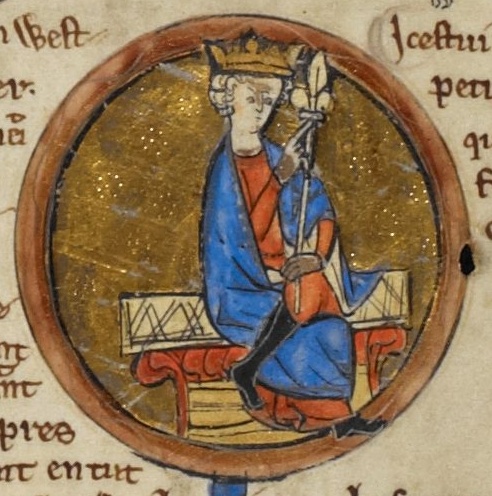
Egbert has been called 'the first king of all England', a rather grand claim which depends on how you define 'Britain'. Egbert was a son of Ealhmund, the Kentish king, and grandson of king Eafa of Wessex, but not the heir apparent to the Wessex throne. Before reaching Egbert, the crown adorned the heads of Cynewulf and Beothric, whose rule began after the murder of Cynewulf in AD 786.
Egbert's troubles began when he contested Beothric's claim to the throne. Egbert lost the ensuing political struggle, and took refuge at the court of Offa of Mercia. But Beothric soon negotiated an alliance with Offa, with the understanding that Offa would surrender Egbert to Beothric.
Despite the treaty, Offa did not hand Egbert over to his enemy but instead sent Egbert into exile, forcing Beothric to be satisfied only with Offa's daughter's hand in marriage. An alternative view of events suggests that Offa forced Egbert into exile. In AD 789, Egbert fled to the Frankish lands, staying in Charlemagne's court and possibly serving in his army.
By the time he returned in AD 800 Egbert had developed a strong sense of military strategy and tactic. He claimed the throne, and was accepted as ruler by the Mercians in 802. His bid for the throne of Wessex may have been supported by Charlemagne, and possibly by the Pope.
It was not an easy accession; the Hwicce of Mercia, led by Aethelmund, attacked on the day of Egbert's accession to the throne. They were met by Egbert's brother-in-law Weohstan, an ealdorman of Wessex. Both Weohstan and Aethelmund were killed and the Hwicce were pushed back.
As king of Wessex, Egbert set about earning his royal spurs. He established his rule over Kent, Essex, Sussex, Cornwall, much of modern Wales, and set his sights on Mercia, the erstwhile though oft-contested dominant power in Britain.
In 815 the Anglo-Saxon Chronicle records that he sent an army to fight the Dumnonia, who ruled an area roughly equivalent to Cornwall. The Chronicle records another conflict with Dumnonia a decade later in 825, but Egbert had a much more pressing conflict in that year.
The Battle of Ellendun
Beornwulf of Mercia, Offa's successor, was understandably worried by Egbert's military success in the South. In an attempt to redress the balance of power, he took an army south, perhaps taking advantage of the fact that Egbert was occupied with his campaign in Dumnonia, and met Egbert in battle at Ellendun, at Wroughton, near Swindon, in 825. Egbert's forces, despite a disadvantage of numbers, drove the Mercians back across a river that, in the words of Chronicler Henry of Huntingdon, 'ran red with gore'.
Success at Ellendun enabled Egbert to rule Mercian territory in the south-east, but in 829 Egbert defeated Wiglaf of Mercia and asserted his rule over Mercia directly. His victory over Wiglaf gave him access to the mint at London, and he minted new coins with his image, proclaiming himself king of Mercia.
Egbert was called 'Bretwalda', ruler of Britain (or alternatively 'wide-ruler'). Unfortunately, he was not able to maintain control over Mercia and Wiglaf returned the following year and drove him out. But though Wiglaf controlled Mercia once more, Egbert retained control over Surrey, Kent, and Sussex. He gave those former Mercian lands to his son Aethelwulf to rule as a subkingdom under Wessex.
In the final decade of his reign Egbert had to deal with a series of Celtic uprisings and Viking raids in the south-west. He lost a battle against the Danes at Carhampton in 836 but defeated a combined army of the Danes and the West Welsh at Hingston Down in Cornwall just two years later. Egbert's victory at Hingston Down effectively ended the last real British kingdom, though the royal line of Dumnonbia continued.
Yet though he lost control of Mercia, Egbert's military success changed the landscape of Britain and the course of British history. Under Egbert, Wessex ruled all of southern England and effectively ended Kent and Sussex as independent kingdoms.
Egbert died in 839 and was succeeded by his son Aethelwulf. It is worth noting that royal succession at that time was seldom a smooth process, but such was Egbert's level of control that Aethelwulf was unopposed in asserting his inheritance. The south-eastern kingdoms were finally absorbed into Wessex on Aethelwulf's death in AD 858.
Egbert was buried in Winchester, starting a family tradition that was followed by his son Aethuwulf, his grandson Alfred the Great, and Alfred's son Edward the Elder.
Egbert's family life is hazy at best. Though we know that Aethelwulf was his son, we do not know who his wife was. A 15th-century document asserts that she was named Redburga, and was related to Charlemagne. Egbert is supposed to have met her while in exile at Charlemagne's court.
Though a pleasant romantic story, the medieval tale is not generally accepted by historians. Other tales suggest that his daughter was St Eadgyth of Polesworth and he had had a half-sister named Alburga, married to Weohstan (see above) who became a nun after her husband's death and founded Wilton Abbey. Another unsubstantiated tale makes Egbert the father of Athelstan of Kent.
